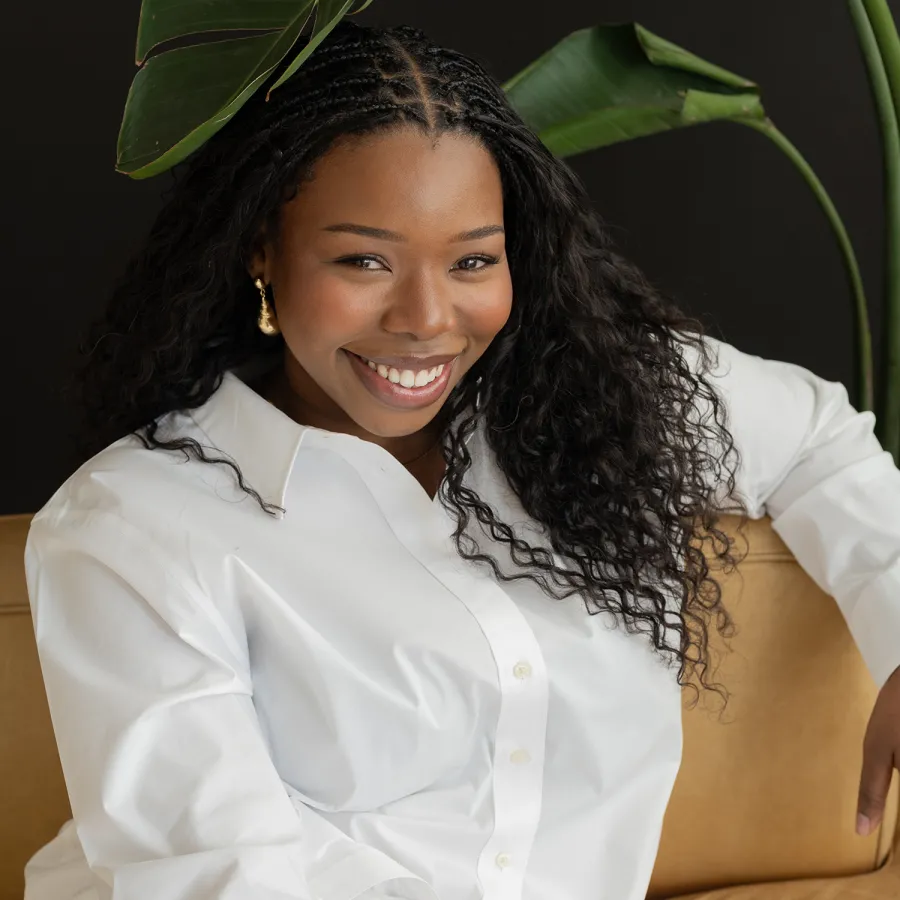Becoming a ‘True Global Citizen‘
Smith Quarterly
Cowiya Arouna ’21 is the first Smithie to be named a Schwarzman scholar
Photo by Olayemi Ibrahim
Published March 10, 2025
Cowiya Arouna ’21 believes China and Africa can transform their current relations into a true economic partnership that benefits both regions.
Her faith in this idea springs from multiple sources: her family’s roots in Togo, western Africa, and her own travels on that continent; her studies of quantitative economics at Smith; and her work since graduation as a member of a global investment team at Bank of America in New York.
This summer, Arouna will start a yearlong master’s degree program in global affairs at Tsinghua University in Beijing as a Schwarzman scholar. The first Smithie to be chosen for this prestigious scholarship program, she will explore aspects of China-Africa relations in hopes of supporting future business ventures on the African continent.
“I would actively contribute as a student, sharing my experiences and networks in America and Togo,” she wrote in her scholarship essay. “My goal is to create value while fostering meaningful relationships that benefit the three regions.”
At Smith, Arouna studied quantitative economics and French and joined the student-led Investment Club. She also served as president of the Black Students’ Alliance and as a student liaison on committees aimed at improving the social climate on campus.
“Throughout my professional development, I’ve grown a passion for following the markets and building on my entrepreneurial skills,” she wrote in her fellowship application. “As a first-generation Togolese American, I often think about a world where economic freedom is possible for the poorest, most underserved communities.”
Arouna was selected as a Schwarzman scholar from a pool of nearly 5,000 applicants—the largest in the program’s 10-year history. She is one of 150 scholars from 38 countries and 105 colleges and universities who are members of the Schwarzman class of 2025–26.
During her study year, Arouna will live in Beijing, attend university lectures, and travel throughout the region. She also hopes to become “at least conversational” in Mandarin.
Here’s what Arouna had to say about what the scholarship means to her.
How did you become interested in China?
I wrote an investment thesis about why this is a good time to be investing in educational technology, agricultural technology, and other technology platforms in Africa. Just doing the research highlighted how much China is doing in Africa but also led me to study more about China’s economic policies and reform. The core of it was about the Chinese people’s embrace of their culture and, through that, finding markets and ways to grow. I thought that was really applicable to Africa because Africans need African solutions and financial partnerships that are coming from an equal place.
You have a particular interest in the synthetic hair industry in China and the possibilities for joint business ventures in Africa.
My mom started braiding hair when she immigrated here in the 1990s. When she and my dad got their first house, they transformed part of the first floor into a salon. I grew up in that salon, and I learned how to braid hair. In my dorm room at Smith, I would braid my friends’ hair for extra money. To my dismay, I discovered that a lot of the braiding products we use are extremely toxic. And this is an industry that impacts mostly Black women. I wanted to understand the synthetic hair industry, which is largely based in Asia. For the [Schwarzman] master’s thesis, I’m hoping to study the production and manufacturing of plant-based products and whether large-scale manufacturing of those consumer products can be cost-effective and efficient.
What elements of your Smith experience helped prepare you for where you are now?
I learned so many lessons at Smith, but I think the most important one is that who you are does not need to be defined by who you’ve been or who the world thinks you are. I’m a Black woman, and in this country I’m a minority who many try to define by race or gender. But in reality, who I am is more defined by my family, the language I speak, the religion I practice, the things I believe in and value, and what I spend my time doing. Smith created a space where I could be interested in economics and French and how the world works. I got to try hard things and be excited about things I never knew were possible. Smith gave me the confidence to say, “I want to be part of the world of private equity and investment decision-making” and be able to navigate it and go for it.
What are you most looking forward to about your year in China?
Meeting true global citizens. Being with people who have different experiences in the world that humanize the things you’ve studied or the assumptions you have and the opinions you hold. I’m very excited about being amongst those types of people.
